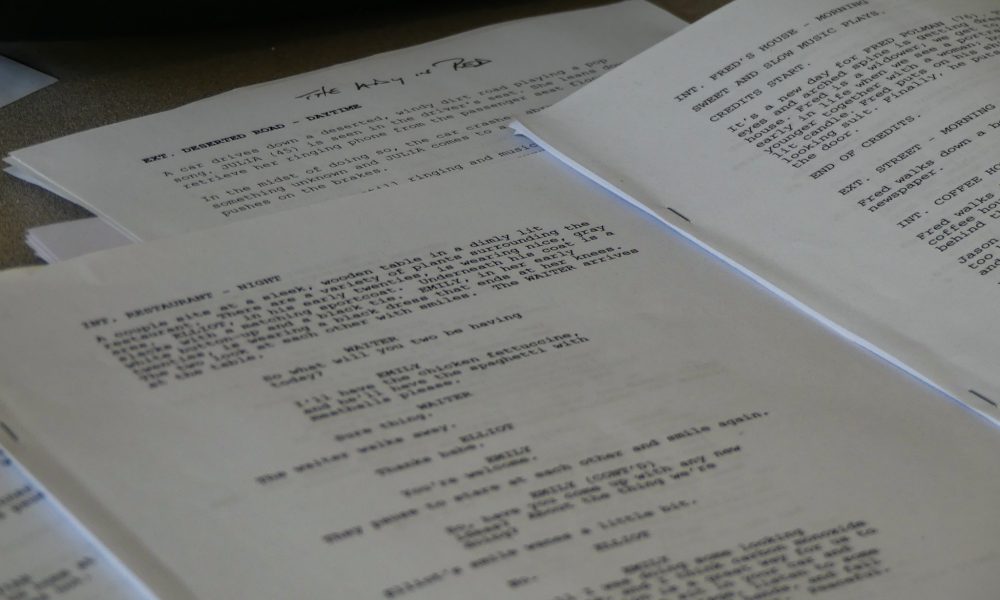Before the cameras can roll and actors can assemble, the show has to be conceptualized. Who’s the protagonist? What’s the situation? The setting?
In the Film and Electronics Art Department at Long Beach State, students learn the craft of scriptwriting, but a class is not quite like a career.
To give students a chance to see what a professional TV writer’s room is like, FEA professor Geoffrey Geib has once again started hosting his Running the Room workshop for spring 2023.
Originally founded by professor Adam Moore, the current program, featuring a main creator student with the other students as co-writers, has existed for about a year.
Beyond his experience in the final few seasons writing for the television show “Medium,” Geib has also developed an original pilot for TNT and helped in “a variety of consulting and rewrite work” simultaneous with his teaching.
The room itself consists of several writers, with every member having specific roles, ranging from producers to writer’s assistants responsible for documenting everything. Still, before any writing can even start, the team needs a concept.
This is where the pitch comes in. Students that took FEA 409 “Writing the Episodic Series Pilot” are allowed to pitch their concept.
Most students proposed sitcom concepts. Beyond just the tones and writing expected in the story, making sitcoms on television is even distinct in the room’s expectations and methods versus other genres, such as dramas.
With more people, Geib explains that there are “more people to assist with the joke-writing.” Writers will take on roles ranging from developing the narrative and creating new episodes to just making jokes and improving prior scripts.
Even then, a funny situation does not alone make a good work of art.
“Stories are foundational to everything within television and film. So I look for the elements of story,” Geib emphasized for pitches. “It doesn’t have to be complete, not everything has to be figured out, but if there are the elements of story within the pitch, then I know it’s workable.”
During the first meeting, each pitch was thoroughly analyzed, with writers suggesting or asking questions that developed concepts ranging from character motivations to potential jokes to interesting dynamics.
With an entire semester to go, though, even a winning pitch is likely to change and improve dramatically.
Fourth-year film major Jesus Cervantes, who has an emphasis in screenwriting, was one of the students that pitched; his idea being a time traveler seeking his soul mate.
While his pitch was discussed, Cervantes recalls that “it was really interesting hearing everyone’s different dilemmas and questions for the story,” for example, by exploring how to improve the likability and complexity of one of his characters.
For now, the Writer’s Room is still in its early stages, learning to work together as a team of writers for their pilot episode. When their piece is done, they expect “a live read with actors in front of an audience.”
Now almost halfway through April, the Writer’s Room is now well underway. Professor Geib plans for the rest of the month to consist of outlining, the first draft, revisions, and punch-ups for the script’s jokes.
So far, the team has been active and engaged. They’re on schedule as well, which Geib notes is “a great success in any kind of writer’s room.”
In May, actors from the theater department or even outside the school are set to read the script, which will be an open event.
“Our hope is that many students from the department, as well as anyone in the greater CSULB community, will come in to listen to the to the live read,” he said.
Over the course of the Writer’s Room, some students have risen to the challenge, like Trina Umana, who has ended up as the supervising producer.
“So far, I’ve just been head of controlling teaser, making sure that that’s all nice and wrapped up and ready to go for actually writing.”
For Umana, she’s enjoyed the development of the team’s ideas and characters. Compared to her classes, it’s much more of a collaborative process in developing their script as a team, which is something much more akin to the real-world process of script development.
Students interested in the script reading can check for updates through the CSULB Film Instagram, where last year’s Writer’s Room had been announced.




